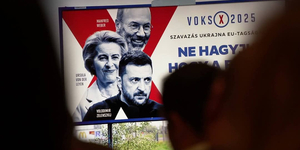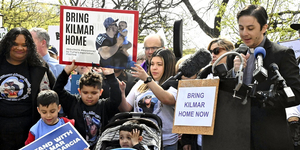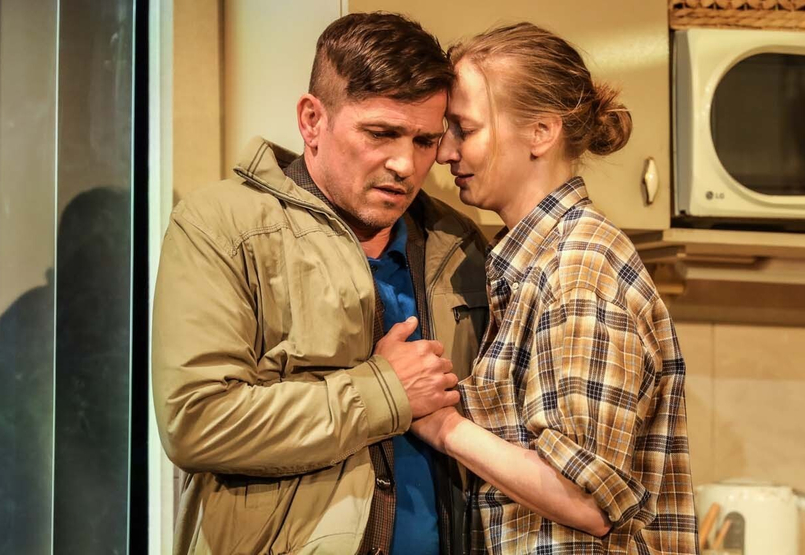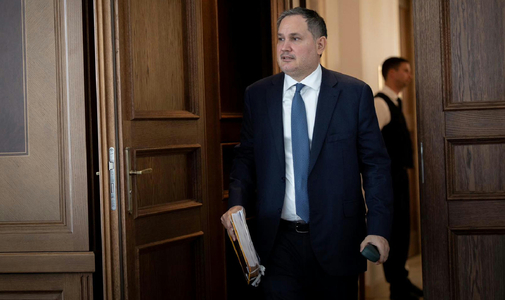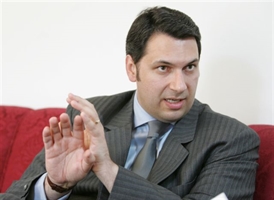 © Horváth Szabolcs |
It was his parents who made the move to the city, though "even today, my father has some 40 to 50 hectares." As for Lazar himself, "my teachers wanted me to study the humanities," but he preferred law, though he was getting involved in politics by 1995, working for the Christian Democrat mayor Andras Rapcsak in City Hall. His parents warned him away from Rapcsak, who was then prominent in national politics, warning him of his "shadowy affairs." Lazar was sure he could take care of himself, though, and within two years he was the mayor's personal assistant. When his boss was suspended in 1999, he stuck beside him. But he took care to distinguish himself from his boss: he joined Fidesz in 1999, joining the Hungarian Christian Democrat Alliance as well in 2002. His mentor was later re-elected, but died unexpectedly in 2002, allowing Lazar to take up his seat in parliament, later inheriting the office of mayor as well. "I didn't want to follow him, I did many things differently," he says. He repeated his parliamentary and city successes last year.
"I love painting. My office walls are decorated with my pictures. Sometimes I play tennis. If I lose, then I fume at home all evening." This is a man who does not like losing. His home is an old "middle class house that we restored," though he, his teacher wife and their 3-year-old son Boldizsar often escape to the holiday home in Revfulop.
Even before events in Mindszent you said that a local who had a heart attack on the main square in Hodmezovasarhely could not be taken to the local hospital. Are you still saying this?
This is health reform on the cheap. The point is that the system is chaotic. It's true: if somebody falls ill on the main square here and the ambulance crew decide the patient is in a stable condition, they'll take him to Szeged. But what if he dies on the way?
I don't know if you're happy about this, but it was this comment that made you famous around the country. Hodmezovasarhely's citizens have known you for longer. Do you think this verbal jousting has made you more popular?
I'd be glad if the people of Hodmezovasarhely saw that their mayor was fighting to preserve their hospital. Outsiders may think we're a city of malcontents, which isn't a good thing, and I'm not happy about it. But my sense of justice forced me to make a stand.
You also asked the citizens of your city to stop subscribing to Delvilag [Southern World], Csongrad county's daily paper, because the paper should have been defending the hospital, you said.
I didn't say that. I said citizens of Vasarhely should think carefully about whether it was right to subscribe to a paper which took the government's side in its editorial and didn't stand up for the people of Vasarhely.
It's almost as if we're seeing a new political grouping emerging. While the Socialist-Liberal media keeps noticing that Lajos Kosa, Zoltan Pokorni and Antal Rogan, all mayoral colleagues of yours, are outdoing each other to be restrained and reasonable, you look like Fidesz's new hard man. You even fight people within the party. First you sacked the hospital director appointed by your predecessor Andras Rapcsak, and then you got into a squabble with the architect Imre Makovecz, a close confidante of Viktor Orban? Are you a bit of a fighter?
I'm trying to build a younger, more dynamci local elite. As for Makovecz - just being Makovecz doesn't mean you can't design bad buildings. I was standing up for the city's interests. We managed to build a swimming pool that was better and cheaper than the one he dreamed up.
Fine, but what did Orban say?
He asked me what I had against the poor man. And I told him. I'm one of those rare people who always say what they think.
You never have doubts about the validity of your opinions?
I stand up for my views when I'm right. But I spend a long time wondering whether I made the right choice. I've been advised to stop thinking over things again and again, because it just wears me out - but my curiosity is stronger. I even read articles that have a critical take on me.
It wasn't curiosity that took you into the courtroom when you were sued by Aron Monus, another famous son of your city, who is also a holocaust denier and the publisher of the latest Hungarian edition of Hitler's Mein Kampf. And this because you said he should either be in an asylum or a prison. How are things between you nowadays?
There's nothing between us. The trial has come to an end, and it the result was close. I didn't lose. But regardless, I regard it as the shame of our 16-year-old Hungarian democracy that he can say these things without any legal consequences to suffer, regardless of who is in power.
How did you find a place for yourself in Fidesz's leadership? Who gave you a leg up?
I started talking to Fidesz intellectuals like Maria Schmidt, Janos Martonyi and Istvan Stumpf. But I'm closest to Tibor Navracsics. Until then, I hadn't spoken to a senior Fidesz leader for years. Then the others started to accept me, even though I'm not a member of the founding elite nor of Fidelitas. I'm from the provinces, the mayor of a medium-sized town.
You're better known for opposing the health reforms than for reforming education in your own town. But even the liberals are said to like your work on education. Many suggest your teacher wife is behind it. Did you discuss it with her? Could liberal support ruin your reputation in the conservative camp?
Not at all. There is such a thing as national liberalism. I'm sorry that Fidesz is not more aware of this. My wife didn't bring about the reforms, but she did approve of them. We do discuss these things at home. We talk about disadvantaged children, about segregation in the Hungarian education system, about the frustrations of both very poor and very rich children.
Going on what you've said just now, Fidesz's seasoned politicians could be in trouble at the next internal party elections. What would happen if you were offered a national party post?
I'm not aiming for a party career. My ambition is for my party to become the governing party while I am still mayor. I have no other aims.
ANDRÁS LINDNER - ZOLTÁN HORVÁTH


